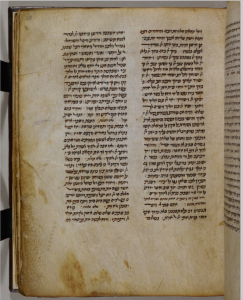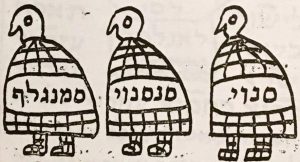| Source (Hebrew) | Translation (English) |
|---|---|
מימיני מיכאל משמאלי גבריאל מלפני אוריאל ומאחרי רפאל ושכינת אל על ראשי וסנויי וסנסנויי וסמנגכלף |
May Mikhael be on my right, Gavriel on my left, Uriel before me, and behind me, Refael, and above my head, Shekhinat-El, and Sanoi[1] Sanoi [Sana’ui according to Moses Zacutto]), derived from the initials of three words samim nataf ush’chelet — “sweet spices, stacte, and onycha,” in Exodus 30:34. Thanks to Jacobus Swart for his explanation. and Sansanoi[2] Sansanoi [Sansina’ui according to Moses Zacutto]), is a variant of the word b’sansinav — “of the boughs thereof” in Song of Songs 7:9. Thanks to Jacobus Swart for his explanation. and Semangklaf.[3] A variant spelling for the angel Semangelof. The name appears as סנמגליי in the British Library MS. 27200 v.23r. In JTSA MS. 8092, the –וף ending of סמנגלוף follows on the next line. Abraham Berliner transcribed it as סנמגלי. Semanglof is said to have originated from the words samim ul’vonah zakah — “sweet spices with pure frankincense”, also found in Exodus 30:34 (see above note on ‘Sanoi’). Thanks to Jacobus Swart for his explanation. |
This “angels on all sides” formula for protection in the Bedtime Shema can be found in §77 of Abraham Berliner’s 1893 edition of the Maḥzor Vitry (transcribing British Library MS. 2700 f.23r). The formula also appears in one of the oldest manuscripts of Maḥzor Vitry, JTSA MS. 8092 f.28v, held in the collection of the Jewish Theological Seminary of America. (Note that the manuscripts differ in the placement of the formula within the macroform of the Bedtime Shema.)
This invocation is discussed briefly within the context of other liturgical and theurgical works containing an “angels on all sides” formula in “‘Gabriel is on their Right’: Angelic Protection in Jewish Magic and Babylonian Lore” by Dan Levene, Dalia Marx, and Siam Bharyo in Studia Mesopotamica (Band 1: 2014) pp.185-198. The authors include a chart listing the various numinous entities associated with each direction in a number of comparative bowls, amulets, and other texts.
It occurred to me while working on this text, that the “angels on all sides” formula describes the divine chariot, with either a divine steed (Susiel) or illumination (Uriel) in front, a support for the rider that is either comfortable (Menuḥa) or healing (Refael) behind, and complemented by strong powers on either side suggesting incredible force (Gavriel/Harba’el) and striking damage (Mikhael). Shekhinat-El, above, may be described by this image as the wreath crown (keter) or the divine favor granted to the chariot rider. If this depiction is correct, then what we have here is something like the chariot of Helios projected onto the person requiring divine protection. The innovation of the angels Sanoi, Sansanoi, and Semanglof in this formula makes sense to me only when their respective names’ scriptural association with ingredients for pleasant aromas is considered (Exodus 30:34 and Song of Songs 7:9). As forces associated with sacred ingredients for incense, these angels may be the numinous embodiment of a heavenly miasma acting to ward off worldly evils associated with bad odors. Indeed, their role as guarantors to a promise Lilith made to Adam and Ḥavah not to harm their progeny (in a tale found in the Alphabet of Ben Sira) is framed within the fragrant setting of the primæval Garden. Before crossing the threshold between wakeful awareness to sleep and dream, such a prayer invokes all the different powers one needs for protecting one at their most vulnerable for a healing, undisturbed rest. –Aharon Varady
Source(s)


Notes
| 1 | Sanoi [Sana’ui according to Moses Zacutto]), derived from the initials of three words samim nataf ush’chelet — “sweet spices, stacte, and onycha,” in Exodus 30:34. Thanks to Jacobus Swart for his explanation. |
|---|---|
| 2 | Sansanoi [Sansina’ui according to Moses Zacutto]), is a variant of the word b’sansinav — “of the boughs thereof” in Song of Songs 7:9. Thanks to Jacobus Swart for his explanation. |
| 3 | A variant spelling for the angel Semangelof. The name appears as סנמגליי in the British Library MS. 27200 v.23r. In JTSA MS. 8092, the –וף ending of סמנגלוף follows on the next line. Abraham Berliner transcribed it as סנמגלי. Semanglof is said to have originated from the words samim ul’vonah zakah — “sweet spices with pure frankincense”, also found in Exodus 30:34 (see above note on ‘Sanoi’). Thanks to Jacobus Swart for his explanation. |

“מימיני מיכאל | “Mikhael is on my right,” an apotropaic invocation of angelic protection in the Bedtime Shema from the Maḥzor Vitry (ca. 11th c.)” is shared through the Open Siddur Project with a Creative Commons Attribution-ShareAlike 4.0 International copyleft license.






![[Ḳameʻ] : [ʻavur Mirḳada d.m Ṿiadah bat Donah] (Columbia University Hebrew Manuscripts Collection, MS General 194) - cropped](https://opensiddur.org/wp-content/uploads/2020/08/ldpd_11683790_000_00000001-featured-image.jpg)



Comments, Corrections, and Queries